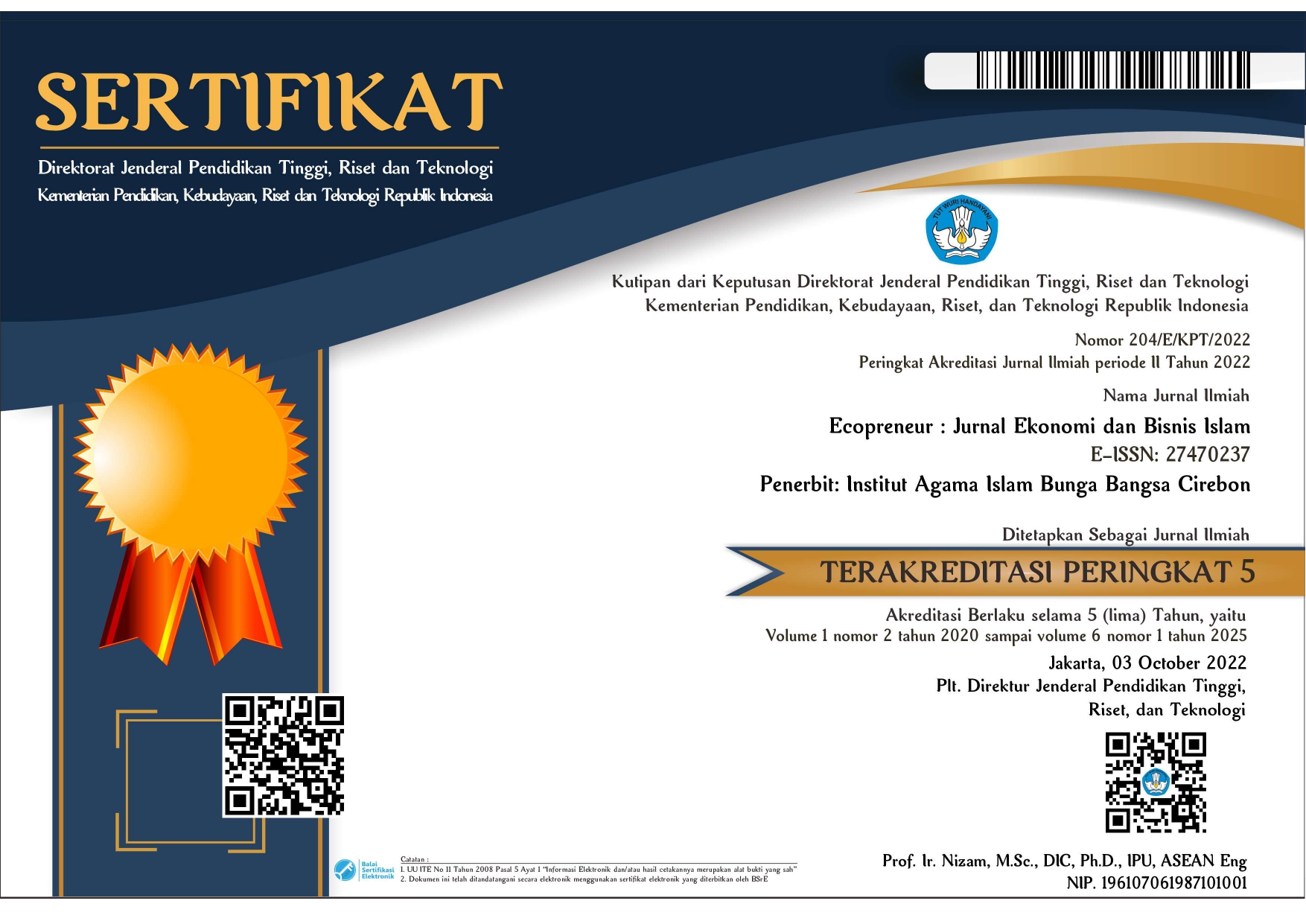The Effect of Financial Compensation on Employee Performance Moderated by Religiosity
Abstract
Employee performance is a crucial aspect in achieving organizational goals. This study aims to investigate the effect of financial compensation on employee performance, by considering religiosity as a moderating factor. Expectancy Theory is used as a foundation to explain how the perception of financial compensation can motivate employees to achieve their work goals. This study uses a quantitative approach with a survey type. The sample used a saturated sample consisting of 83 respondents who were the entire population sampled. The research instruments used included questionnaires to measure perceptions of compensation fairness, satisfaction with compensation, levels of religiosity, and achievement of employees' work goals. Data analysis was conducted using multiple regression to evaluate the relationship between independent and dependent variables, as well as the interaction between financial compensation and religiosity. The results of the study The Effect of Financial Compensation on Employee Performance Analysis shows that both the perception of compensation fairness and satisfaction with compensation have a positive and significant influence on the achievement of work goals and the evaluation of the quality of employee work results. This indicates that employees who feel treated fairly in terms of compensation and are satisfied with the rewards received tend to achieve better performance, and the results also show that religiosity moderates the relationship between financial compensation and employee performance. The interaction between the perception of compensation justice and the level of religiosity shows that the positive influence of compensation on the achievement of work goals can be influenced by the individual's religious level. These positive influences tend to decrease as levels of religiosity increase, highlighting the importance of considering religious values in compensation management to support motivation and optimal performance in the workplace.
Keywords: Financial compensation, employee performance, religiosity,
Downloads
References
Rasheed, A., Humayon, A. A., & Aftab, S. (2021). Employee personal values and job satisfaction: Exploring the role of organizational commitment and psychological empowerment. Journal of Business Research, 132, 375-387. https://doi.org/10.1016/j.jbusres.2020.08.055
Farooq, R., & Pavez, I. (2018). Impact of ethical leadership on employees' well-being: The mediating role of organizational justice. Journal of Business Ethics, 157(1), 121-134. https://doi.org/10.1007/s10551-017-3678-3
Akbar, M. A., Noor, M. S., & Hamzah, N. (2020). The influence of religiosity on work motivation and employee performance. Asian Journal of Business and Management Sciences, 9(2), 45-58. https://doi.org/10.15449/2020.3027.9
Rizwan, M., Nadeem, M., & Abbas, J. (2022). Moderating effect of religiosity on the relationship between work-related stress and job satisfaction. Journal of Religion and Health, 61(2), 789-804. https://doi.org/10.1007/s10943-021-01318-0
Ahmed, S., Hassan, M., & Rana, M. B. (2023). Exploring the moderating role of religiosity in the relationship between work-family conflict and job satisfaction in a multicultural context. Journal of Cross-Cultural Psychology, 54(1), 122-137. https://doi.org/10.1177/0022022123110188
Milkovich, G. T., & Newman, J. M. (2008). Compensation. New York: McGraw-Hill.
Lawler, E. E. (1981). Pay and organizational effectiveness: A psychological view. New York: McGraw-Hill.
Martocchio, J. J. (2016). Strategic Compensation: A Human Resource Management Approach. Boston, MA: Pearson Education.
Pargament, K. I. (2013). Religion and Coping: The Current State of Knowledge. The Guilford Press.
Hill, P. C., & Pargament, K. I. (Eds.). (2008). Research in the Social Scientific Study of Religion. Brill.
Fetzer Institute/National Institute on Aging. (1999). Multidimensional Measurement of Religiousness/Spirituality for Use in Health Research: A Report of the Fetzer Institute/National Institute on Aging Working Group.
Vroom, V. H. (1964). Work and Motivation. John Wiley & Sons.












